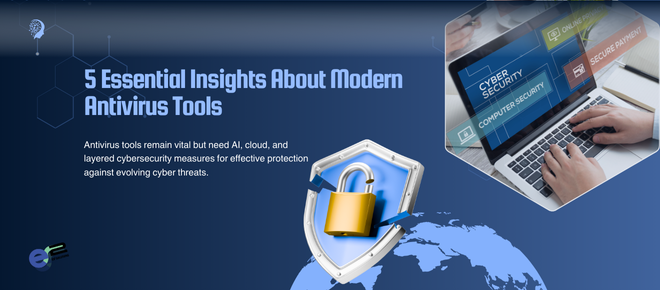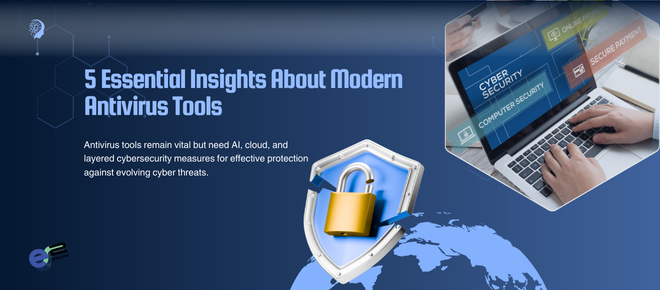Five Essential Insights about Modern Antivirus Tools
GUI Admin
2025-01-09


Five Essential Insights about Modern Antivirus Tools
GUI Admin
2025-01-09
5 Essential Insights About Modern Antivirus Tools
Cybersecurity has become a major worry for both individuals and organizations in the current digital era. Antivirus software is one of the first lines of defense among the various instruments made to counteract cyberthreats. But how applicable and useful are these technologies now, given the growing complexity of cyberattacks? This article explores five essential facts regarding contemporary antivirus software, illuminating its importance, drawbacks, and factors to consider while selecting one.
- Antivirus Software: Still Relevant but Not a Silver Bullet
Antivirus software is still crucial for shielding computers from a variety of infections, even in the face of an increase in sophisticated cyberthreats. Contemporary antivirus programs protect against trojans, ransomware, spyware, and other harmful software in addition to identifying and eliminating infections.
It's crucial to remember that antivirus software cannot offer total security on its own. Cybercriminals are now increasingly skilled at creating sophisticated attacks that evade detection systems. Additional cybersecurity measures like firewalls, intrusion detection systems (IDS), and endpoint protection solutions should be used in conjunction with antivirus software to improve protection.
- How Antivirus Tools Work: Signature and Behavior-Based Detection
Antivirus tools primarily rely on two detection mechanisms:
- Signature-Based Detection: This method compares files against a database of known malware signatures. While effective for identifying established threats, it struggles to detect new or modified malware.
- Behavior-Based Detection: To address the limitations of signature-based detection, modern antivirus tools monitor programs and processes for suspicious behavior. For instance, if an application suddenly attempts to encrypt files en masse, it may be flagged as ransomware.
A combination of these methods enhances an antivirus tool’s effectiveness, making it better equipped to tackle zero-day threats and previously unknown malware.
- The Role of Artificial Intelligence and Machine Learning
The use of machine learning (ML) and artificial intelligence (AI) into antiviral software has revolutionized the industry. These technologies make it possible to use tools that can spot abnormalities and trends that point to malicious behavior. Real-time data analysis by AI-driven antivirus programs allows them to identify dangers that conventional techniques might overlook.
An AI-powered antivirus program, for instance, may identify phishing websites by examining their language, structure, and behavior—even if the URL is completely original and has never been reported before. Response times are greatly shortened and overall security is improved with this proactive strategy.
- Cloud-Based Antivirus: Efficiency Meets Modern Needs
As more devices become connected and the amount of data continues to grow, traditional antivirus solutions installed directly on devices can become resource-intensive. Cloud-based antivirus tools address this issue by offloading most of the processing to the cloud.
This approach offers several benefits:
- Faster Updates: Malware databases in the cloud are updated in real-time, ensuring the latest threats are detected immediately.
- Reduced Device Impact: By shifting computational workloads to the cloud, devices experience less lag and improved performance.
- Scalability: Cloud-based solutions are better suited for organizations with large networks, offering seamless scalability and centralized management.
- Choosing the Right Antivirus Tool
With a myriad of antivirus tools available, selecting the right one can be overwhelming. Here are some key factors to consider:
- Comprehensive Features: Look for software that offers multi-layered protection, including anti-phishing, ransomware defense, and safe browsing tools.
- Ease of Use: An intuitive interface and simple setup process can save time and effort.
- Performance Impact: Ensure the tool doesn’t significantly slow down your system, particularly if you’re using older hardware.
- Customer Support: Reliable customer service can make a huge difference in resolving issues promptly.
- Cost: While free tools offer basic protection, premium solutions often provide advanced features and better overall security.
Final Thoughts: Beyond Antivirus
Antivirus software is still essential to cybersecurity, but it is not the best option. A comprehensive strategy that includes frequent software upgrades, cyber hygiene training for staff, and reliable data backup procedures is required due to the quickly changing cyber threat scenario.
Keep in mind that everyone has responsibility for cybersecurity. Effective antivirus software and preventative actions may greatly lower your risk of cyberattacks and guarantee safer online experiences.
Latest Blog




